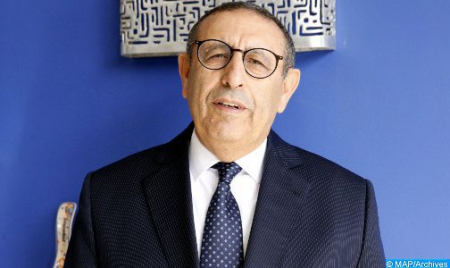Morocco’s Amb. to South Africa Deconstructs Pretoria’s Argument on Moroccan Sahara Issue
Morocco’s ambassador to South Africa Youssef Amrani has strongly refuted the false South African allegations on the Moroccan Sahara issue expressed recently by the Deputy Minister of Foreign Affairs Alvin Botes, in an op-ed piece dedicated to the Moroccan Sahara issue and which was published in the party’s magazine “ANC Today”. In his response to these derogatory, unfounded and misplaced accusations, the Moroccan diplomat deconstructs the South African rhetoric on the Moroccan Sahara issue and rectifies the misconceptions, spurious allegations and intellectual shortcomings of an ideologically biased and narrow vision. Moreover, this blind alignment with Algerian theses raises legitimate questions about its purpose and usefulness, betraying the very essence of the ambition, vision and ideal of building a strong and unified African continent. He, in fact, recalled Morocco’s historical commitment to the struggle against colonization and apartheid which was instrumental in the establishment of the liberation movement in South Africa. Denying this historical truth, admitted by the late Nelson Mandela himself, is an insult to the sacrifices of the Moroccan people in its struggle against colonialism and overlooks its unwavering support and solidarity and its voluntary support to the brotherly African peoples to achieve this same goal, he said. Pointing to the contradictions in the South African position, Amrani wondered how South Africa, which had, during its tenure in the Security Council in 2007, voted in favor of the Resolution on the Moroccan Sahara issue enshrining the pre-eminence of the “autonomy initiative” and the political process, can it still promote outdated theses and abandoned for over 20 years? To persist, without any sense of coherence or reason, in considering the referendum as the panacea for the resolution of the Moroccan Sahara issue, only keeps alive an obsolete concept of a bygone era that has been clearly abandoned and buried by the United Nations and the international community, added the ambassador. Returning to these unjustified and unfounded semantics on the human rights issue, the ambassador explained uncompromisingly that Morocco has nothing to hide and has neither complexes, nor taboos, nor lessons to learn. Indeed, Morocco, a thousand-year-old nation, whose DNA is marked by the ideals of peace, tolerance and openness, has irreversibly enshrined the principles of human rights in their universality in the Constitution of the Kingdom. The massive participation of the populations of the Southern Provinces in the general and local elections of September 2021 is an unequivocal sign of their full commitment to the process of building democracy in the Kingdom. In his letter, the ambassador regretted that the article endorses the false assertions made about the so-called “activist” Sultana Khaya, even deviating from the main topic to simply disseminate the propaganda of “polisario”. Amrani recalled in this regard that after the intentions, lies and dishonest methods of this person had been exposed, several officials and UN bodies have consciously distanced themselves from her deceptions and insidious allegations. Similarly, the Moroccan ambassador refuted, with figures, the allegations that “Morocco is exploiting the resources of the Sahara region”. He recalled that since its independence, Morocco has placed among its main priorities the construction of the region’s infrastructure and socio-economic development. This human and inclusive development has been reinforced by the adoption, 8 years ago, of the Development Model dedicated to the Southern Provinces, designed with the full participation of the local population in all phases of its planning and implementation. The results of this vision have, today, reached 80% of realization of the allocated budget which amounts to more than 7.5 billion dollars, while the main socio-economic indicators show better performance in the Southern Provinces than in the rest of the Kingdom, especially in terms of GDP per capita which is 50% higher than the national average, or in terms of poverty rate three times lower than the national average, he noted. Denouncing the instrumentalization of the human rights issue for political purposes, Ambassador Amrani questioned the deputy minister about Pretoria’s blindness and the guilty silence on the disastrous humanitarian situation in the Tindouf camps, in Algeria. How is it possible that Tindouf is the only “refugee” camp in the world where the UNHCR is not allowed to do its work? How is it acceptable that Algeria has subcontracted the protection of human rights on its own territory to an armed separatist group? This de facto devolution of responsibilities from Algeria to the “polisario” on its territory has placed the populations of the camps in a situation of precariousness, abandonment and insecurity, depriving them of access to the institutions of judicial recourse, in total violation of international conventions and treaties signed by Algeria. There can be no delegation of sovereignty and therefore responsibility by a state to an armed militia on its territory, he said on this subject. For the Moroccan people, the Sahara issue is more than just an item on the agenda of the Security Council, explained the ambassador. It is an issue intimately linked to the sovereignty of the Moroccan nation, he said. The Moroccan Autonomy Plan is not only recognized by the UN Security Council and the major powers as credible, serious and realistic, but also as the trigger for the UN-led political process that we all seek to support, he added. In the current complex geopolitical context, the Autonomy Plan is truly a testimony of Morocco’s openness to a constructive and pragmatic solution without undermining the Kingdom’s territorial integrity. It is proof, if any were needed, of the Kingdom’s sincere commitment to lasting peace, homogeneity, integration and prosperity in the region and on the continent as a whole.

